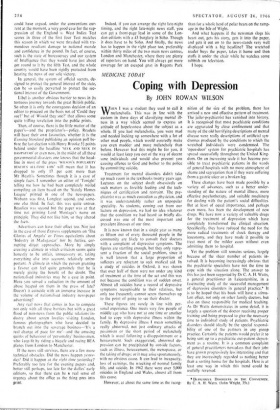Coping with Depression
MEDICINE TODAY
By JOHN ROWAN WILSON
Treatment for mental disorders didn't take up much room in the textbooks twenty years ago. Lectures on the subject dwelt obsessively on such matters as forcible feeding and the tech- niques of certification and restraint. The psy- chiatrist was as much custodian as physician, and it was understandably rather an unpopular speciality. As students, coming out from our lecture on depression, we had no idea whatever that the condition we had heard so briefly dis- cussed was one of the most important and prevalent illnesses of our time.
It is now known that in a single year as many as fifteen out of every thousand people in the community are likely to consult their doctors with a complaint of depressive symptoms. The figures are startling enough, but they only repre- sent a fraction of the social problem, since it is well known that a large proportion of sufferers are reluctant to seek medical aid. In a study of suicides in Oxford, it was shown that over half of them were not under any kind of treatment at the time of the act and this was not because the condition was of sudden onset. Almost all suicides have a record of depressive symptoms recognisable to their relatives, but only too frequently cannot screw themselves up to the point of going to see their doctor.
These figures are surely in line with per- sonal experience. One meets very few people of middle age who have not at one time or another had to cope with depressive illness within the family. By depressive illness I mean something really abnormal, not just ordinary attacks of pessimism or the short period of melancholy which is usual following a disappointment or a bereavement. Such exaggerated, abnormal de- pression can be precipitated by outside factors, such as illness, bereavement, the menopause, or the taking of drugs; or it may arise spontaneously, with no obvious cause. It can lead to incapacity, loss of earnings, the wrecking of normal family life, and suicide. In 1962 there were over 5,000 suicides in England and Wales, almost all from this cause.
However, at about the same time as the recog- By C. A. H. Watts. (John Wright, 35s.)
nition of the size of the problem, there has arrived a new and effective pattern of treatment. The jailer-psychiatrist has vanished into history. It is recognised that most psychiatric conditions are aggravated by close confinement and that many of the old horrifying descriptions of mental disease were really descriptions of artificial syn- dromes produced by the conditions to which the wretched individuals were condemned. The `open-door' system for psychiatric hospitals has spread successfully throughout the United King- dom. On an increasing scale it has become pos- sible to treat psychiatric patients in the wards of general hospitals with no more atmosphere of shame and segregation than if they were suffering from a gastric ulcer or a broken leg.
These changes have been made poSsible by a variety of advances, such as a better under- standing of the nature of mental illness, more effective psychotherapy, and suitable machinery for dealing with the patient's social difficulties. But at least of equal importance, and perhaps even more, has been the development of new drugs. We have now a variety of valuable drugs for the treatment of depression which have completely transformed the clinical situation. Specifically, they have reduced the need for the more radical treatments of shock therapy and leucotomy, and they have made it possible to treat most of the milder cases without even admitting them to hospital.
Yet the problem still remains serious, largely because of the sheer number of patients in- volved. It is becoming increasingly obvious that the psychiatric specialists have not the time to cope with the situation alone. The answer to this has just been suggested by Dr C. A. H. Watts, a general practitioner in Leicestershire, in a fascinating study of the successful management of depressive disorders in general practice.* It is to be hoped that his book will have a stimu- lant effect, not only on other family doctors, but also on those responsible for medical teaching. As Dr Watts demonstrates in some detail, it is largely a question of the doctor receiving proper training and being prepared to give the necessary time to individual study of patients. Psychiatric disorders should ideally be the special responsi- bility of one of the partners in any group practice. Certainly the patients would prefer it to being sent up to a psychiatric out-patient depart- ment as a routine. It is a common complaint of general practitioners nowadays that their jobs have grown progressively less interesting and that they are increasingly regarded as nothing better than a sorting house for the hospitals. Here is at least one way in which this trend could be usefully reversed.
• DEPRESSIVE DISORDERS IN THE COMMUNITY.






























 Previous page
Previous page